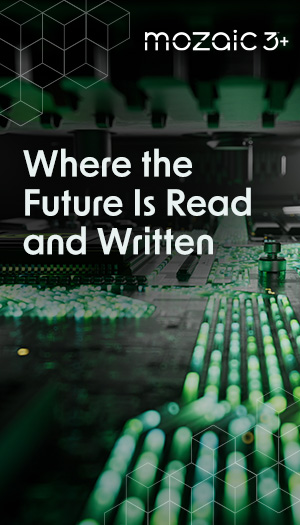With the rapid data growth businesses are experiencing comes the need to efficiently future-proof data storage systems. By doing so, you can protect against unplanned obsolescence and remain competitive for the long term.
Emerging technologies like artificial intelligence (AI), the Internet of Things (IoT), and big data are demanding data storage systems that can keep pace. These same technologies can also help improve data storage cost efficiency and security while enhancing flexibility and scalability.
Technological advancements and exponential data growth have ushered in an age of increased data utilization. With that in mind, there are key considerations to ensure your company’s data storage systems remain adaptive, efficient, and secure. It’s not only about safeguarding today’s data but also preparing for the future.
Future-proofing your data storage systems requires developing a strategy that works best for your organization’s specific needs. Here are some current technology trends, along with critical ways to ensure your data storage remains resilient and adaptive in an era of rapid technological change.
Rapid Data Growth
Constant data growth is causing a fundamental shift in the way businesses operate—from collecting customer insights to managing huge volumes of transactional data related to products and services. Data growth isn’t solely a matter of data volume; it also has a profound impact on your storage infrastructure. The infrastructure must be agile, scalable, and capable of handling massive volumes of information while maintaining data accessibility and integrity.
There are proactive strategies you can implement to anticipate and adapt to future data volume challenges, ensuring your IT infrastructure remains resilient and responsive. To prepare for the challenges posed by exponential data growth, businesses must develop data initiatives that focus on a multifaceted approach. It’s essential to invest in scalable storage solutions that can expand seamlessly to accommodate growing data needs.
Embracing technologies like software-defined storage (SDS) and cloud-based storage can provide the flexibility required to adapt to data growth. Furthermore, data optimization and management techniques such as data deduplication, compression, and automated data tiering can make the most efficient use of your existing storage resources.
Data governance and data lifecycle management strategies are essential, along with clear policies for data retention and archiving. This helps businesses retain valuable data while eliminating redundant or obsolete information. Additionally, predictive analytics can play a pivotal role in forecasting data growth patterns, enabling proactive adjustments to infrastructure before issues arise.
Emerging Technologies: AI, IoT, and Big Data
AI, IoT, and the ever-expanding realm of big data are reshaping data storage strategies. These innovations are paving the way for more efficient and powerful data storage solutions. The emerging technologies are not only consumers but enablers of advanced storage systems, optimizing data storage and retrieval. AI can transform data into actionable insights, IoT interconnected devices continuously generate data streams, and big data can uncover patterns within the vast data oceans. Learn more about Seagate’s big data and analytics solutions.
For instance, by employing AI-driven analytics in the field of predictive manufacturing maintenance, organizations can monitor machinery in real time and detect issues that indicate potential breakdowns. This reduces downtime and optimizes data storage by eliminating the need to store vast quantities of historical, non-relevant data. AI also plays a crucial role in data deduplication and data compression.
Through IoT, businesses can collect data to optimize operations, reduce energy consumption, and improve the overall efficiency of the workplace. IoT also poses significant challenges for data storage since it generates vast quantities of real-time data that need to be processed, stored, and made accessible to decision-makers. Efficient and scalable storage systems are a prerequisite for leveraging the full potential of IoT.
The concept of big data revolves around the processing and analysis of massive datasets. In fields like healthcare—where access to diagnostics, medical records, and patient data is crucial—big data analytics help healthcare organizations make informed decisions, leading to improved patient care. You can also leverage these emerging technologies to secure data storage and future-proof IT infrastructure.
Data Security
Data is not only an asset but the life force of modern companies. Maintaining data security is non-negotiable in a landscape of cyber threats and data privacy regulations. A data breach can be catastrophic, causing financial losses, reputational damage, and legal issues.
An efficient data security strategy integrates encryption, access control, and data integrity. Encryption safeguards data by converting it into an unreadable format, ensuring that even if unauthorized access occurs, the data remains secure. Access control defines who can access and manipulate data, limiting potential threats from both external and internal sources. Data integrity guarantees that data remains unaltered and reliable, maintaining trust in the information you store.
Future-proofed data storage systems should make encryption a standard practice for data at rest and in transit. Implement industry-standard encryption protocols and granular access controls to allow only authorized personnel specific data access. Regularly review and update permissions so they continue to align with your business needs.
Continuously monitor your storage systems for suspicious activity. Conduct regular security audits to identify vulnerabilities and apply timely patches. Consistently back up data and test your recovery procedures to mitigate potential data loss in the event of a security incident. Invest in cybersecurity training for your staff. Human error remains a significant threat, so educating employees about best practices is a critical component of data security.
Unplanned Obsolescence
Unplanned obsolescence can impact storage systems, and consequently, the accessibility and security of business data. In the world of data storage, this can happen several ways. Hard drives may become incompatible with modern software or be unable to handle the increased data. Software applications may no longer receive updates or support, exposing systems to vulnerabilities.
The risks associated with obsolete storage systems can include data inaccessibility and loss. Unsupported software is more susceptible to security breaches, potentially resulting in data leaks. The additional cost of maintaining and repairing obsolete systems can increase exponentially as spare parts become difficult to find.
To ensure long-term data accessibility and security in the face of unplanned obsolescence, periodically evaluate your data storage infrastructure to identify aging components or software. Whenever possible, choose storage solutions built on industry-standard technologies and formats such as a Dell EMC Integrated Data Protection Appliance (IDPA), Dell EMC Unity, or a Dell ECS appliance.
Select data storage solutions that can scale with your company’s growth. Scalable storage can adapt to increasing data volumes without requiring complete overhauls. Plan for data migration and archiving, and ensure data is regularly moved from older, potentially obsolete storage systems to newer, more sustainable ones. When selecting storage solutions and other applicable products, consider the reputation and track record of vendors—such as Dell Technologies Future-Proof Program—to ensure long-term support and seamless upgrades.
By proactively addressing unplanned obsolescence, you can future-proof your data storage systems and promote the continued accessibility, integrity, and security of your organization’s valuable data assets.
Key Storage Considerations
Even the most advanced data storage solutions can fail without a well-planned strategy. Here are some critical considerations for constructing data storage that stands the test of time.
Compatibility
Compatibility is the cornerstone of effective future-proofed data storage. Conflict often arises when bridging the gap between legacy systems and new technologies, which can result in a bottleneck in your data storage infrastructure. Seagate provides solutions to keep your data storage systems compatible and enable a smooth transition between technological generations.
Scalability
Data storage solutions are not static entities; they need to be adaptable and scalable. Integration and scalability are essential to ensure your storage system can expand as your organization’s needs change. Flexible, scalable storage solutions allow you to adapt to growing data volumes and shifting business priorities.
Data Security and Encryption
Data security is the foundation of an efficient data storage strategy. Encryption stands at the forefront of data security, transforming data into an unreadable format to secure confidentiality and integrity. End-to-end encryption guarantees data security throughout its journey—from creation to storage and retrieval. End-to-end encryption is one of the best practices to protect your data storage against evolving threats.
Performance
The speed and efficiency of data retrieval can make or break your operations. Storage performance is the backbone of a system’s ability to deliver data when it’s needed. From solid-state drives to storage tiering, these technologies can optimize performance for a well-tuned data storage system, helping your organization remain agile and responsive in a data-driven world.
Total Cost of Ownership
Managing data storage is not only about upfront costs but also the comprehensive view of total cost of ownership (TCO). TCO encompasses both the initial and long-term costs associated with storage systems. You should make informed decisions about storage investments and cost-saving strategies for future-proofing your storage systems. But it’s not just about how much it costs. Your storage systems need to deliver value and efficiency over time.
Implementation Stage
The implementation stage of future-proofing data storage is where theory transforms into practice. AI and machine learning, predictive analytics, and AI-powered data management play an important part in shaping storage systems that are not only ready for the future, but at the forefront of innovation.
Role of AI and Machine Learning in Future-Proofing Data Storage
Artificial Intelligence (AI) and machine learning are fundamental to safeguarding data storage for the future. They’re advanced technologies and transformative forces that optimize data accessibility, efficiency, and security. AI-driven storage tiering in the cloud uses predictive algorithms for optimal data placement.
Predictive maintenance—a crucial application of AI—enables organizations to foresee and prevent hardware failures, ensuring data is always accessible. AI-driven data management, including automated classification, organization, and retrieval, simplifies the complexities of data handling.
Predictive Analytics for Storage Efficiency
Predictive analytics proactively harness data patterns and behaviors to optimize storage platforms. By exploring predictive analytics algorithms, organizations can anticipate storage requirements, prevent bottlenecks, and enhance data retrieval speeds from their data lakes. IT directors can maximize the return on their data tech stack storage investments by implementing predictive analytics, from data gathering to model deployment.
AI-Powered Data Management
AI-powered data management is the future’s answer to handling ever-expanding datasets. AI excels in data classification, organization, and retrieval, offering time and cost efficiencies while minimizing errors. AI-driven data management solutions are becoming more and more important for assisting companies in managing the flood of data and deriving useful insights.
AI and predictive analytics revolutionize how organizations interact with data in the implementation stage of future-proofing data storage. They offer a roadmap to steer organizations toward data storage solutions that are resilient and forward-thinking.
Future-Proofing Benefits
Organizations can reap substantial benefits from future-proofing data storage. Let’s explore the cost efficiency, robust data protection, and enhanced flexibility and scalability that come with future-proofed data storage solutions.
Cost Efficiency
By adopting these cost-efficient strategies and emerging technologies, organizations experience a profound impact on their bottom line. Return on investment becomes more tangible as organizations save on operational costs and improve energy efficiency.
For instance, tiered storage solutions help manage costs by optimizing the distribution of data across storage media. Here are some real-world examples of cost-efficient storage solutions to demonstrate how organizations can maximize the value of their data storage while minimizing costs.
Robust Data Protection
Robust data protection is a natural outcome of future-proofing. These strategies not only prepare organizations for the future, but fortify their defenses against data loss and disasters. Data backup, redundancy, and recovery strategies are essential components of this approach.
Organizations can boost their data protection by implementing these strategies and best practices to ensure valuable data remains secure. From disaster recovery planning to data redundancy, these measures protect against data loss and enable rapid data retrieval.
Enhanced Flexibility and Scalability
Future-proofing is synonymous with enhanced flexibility and scalability. These attributes are indispensable in adapting to changing business needs. A flexible storage system can seamlessly accommodate growing data volumes and shifting priorities. Scalability guarantees that your storage system expands with your business without requiring yearly, expensive overhauls.
Companies have harnessed enhanced flexibility and scalability to navigate complex market dynamics, seizing opportunities for business growth and optimizing their data management. The benefits of future-proofing are not just conceptual; they are measurable and substantial. Cost efficiency, robust data protection, and enhanced flexibility and scalability can transform data storage from a challenge into a strategic asset.
Seagate Advanced Technologies for Future-Proofing
Seagate is a pioneering force in future-proofing data storage, driving innovation that empowers organizations to stay ahead of the curve. Each of Seagate’s advanced technologies are designed to equip data storage systems for tomorrow’s challenges, including groundbreaking solutions like heat-assisted magnetic recording (HAMR), multi-tier caching technology, and shingled magnetic recording (SMR), both drive-managed and host-managed. Seagate systems solutions also include Exos® enterprise hard drives, Exos CORVAULT™ data storage systems, and recovery and backup solutions.
Heat-Assisted Magnetic Recording
Seagate HAMR employs a laser to heat the recording medium, allowing data to be written at much higher densities while maintaining data integrity. This groundbreaking technology revolutionizes data storage by enabling higher storage capacities and data processing speeds.
Multi-Tier Caching Technology
Seagate’s multi-tier caching technology is at the forefront of optimizing data storage performance. By using a tiered approach for data caching, it ensures that frequently accessed data is readily available, reducing latency and enhancing data retrieval speeds. This technology is a game-changer for industries where rapid access to data is essential, such as cloud storage and content delivery networks.
Drive-Managed and Host-Managed SMR
SMR technology—both drive-managed and host-managed—represents a shift in data storage. Drive-managed SMR optimizes data placement on the drive, while host-managed SMR allows organizations to directly control data placement. The advantages and applications of SMR are diverse, offering cost-effective solutions for massive data storage needs. When employed in data storage, these technologies offer many possibilities for future-proofing data, from archival storage to data lakes.
Systems Solutions: Exos and CORVAULT
Seagate solutions, including Exos enterprise hard drives and Exos CORVAULT data storage systems, are designed to elevate your storage capabilities. Exos offers unmatched performance, scalability, and reliability, making it an ideal choice for demanding data environments. CORVAULT is a comprehensive data protection solution that ensures business continuity and data availability. Seagate data storage systems can be used in various scenarios—from data centers to enterprises seeking high performance and protection.
Data Recovery and Backup Solutions
Seagate data recovery and backup solutions safeguard your valuable data assets. These solutions are the insurance policy against data loss and the resulting disruptions. Seagate helps organizations maintain data protection, adhere to compliance regulations, and ensure business continuity. Reliable backup and recovery options are building blocks for an effective future-proofed storage strategy.
Seagate’s Role in Providing Cutting-Edge Storage Solutions
At Seagate, we understand that every IT infrastructure is unique, and the path to future-proofing data storage requires personalized strategies and solutions. That's why we encourage you to reach out to our experts.
Talk to an Expert
Our commitment to your organization’s success extends beyond providing hardware and software solutions. It includes offering expertise and support every step of the way. Whether you have questions about implementing the latest data storage technologies, need advice on data security, or want to explore the benefits of Seagate’s advanced solutions, our team is ready to provide insights and recommendations specific to your needs.
Talk to one of our experts today for personalized guidance on future-proofing your data storage systems.









